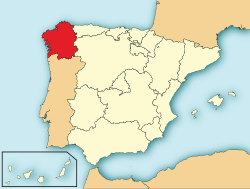Republic of Galicia
Galician Republic República Galega | |||||||||
|---|---|---|---|---|---|---|---|---|---|
| 1931 | |||||||||
| Anthem: Os Pinos | |||||||||
 Location of the Galician State (red) within Spain (white). | |||||||||
| Capital | Santiago de Compostela | ||||||||
| Common languages | Galician | ||||||||
| Leader | |||||||||
• 1931 | Alonso Ríos | ||||||||
| Historical era | Interwar period | ||||||||
• Established | June 27 1931 | ||||||||
• Disestablished | June 28 1931 | ||||||||
| |||||||||
The Galician Republic (República Galega in Galician) was an ephemeral passage in the History of Galicia. It only lasted for a few hours on 27 June 1931, a day ahead of the election to the Second Spanish Republic's Constitutional Assembly. On that date, left-nationalist leaders Pedro Campos Couceiro and Antón Alonso Ríos declared that full independence from Spain was the only way for Galicia to overcome its secular backwardness and to regain its national dignity. Even though the events were triggered by the temporary cancellation of railway building works which would connect Zamora with Ourense, it was the historical marginalization of the country – back then overwhelmingly rural and Galician-speaking – what was at the core of this movement that eventually got defused by negotiation between Spanish forces and the Galician instigators. The date is still celebrated by a number of leftist organizations and champions of the Galician national sovereignty alike.
See also
External links
- 79 anos despois, artigo aparecido no xornal Galicia Hoxe o 20 de xuño de 2010.
- 27 de xuño de 1931: Proclámase a República Galega, reportaxe aparecida no xornal dixital Vieiros o 22 de xuño de 2010.

